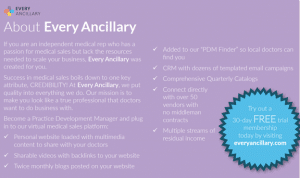Most seasoned medical sales representatives have carried several different products or services over their careers.
Between emerging technologies, expiring patents, and ever-changing insurance coverage, the role of a medical sales professional is to constantly adapt and learn new things.
As you investigate which medical ancillary programs are likely to grow this decade, consider these areas of focus:
REGENERATIVE MEDICINE
The Regenerative Medicine sector has exploded in popularity in recent years, with that trend expected to continue for the foreseeable future. According to one estimate from P&S Research, this market is expected to grow nearly 5x by 2030!
With this kind of market growth, there will be plenty of opportunities for independent medical reps to create a nice business for themselves.
Pros:
- A growing market means a good chance for long-term success with each client
- Mostly cash-pay, which means dependable, fast commissions
- Selling cutting-edge technology is exciting
Cons:
- Highly competitive with new options continually emerging
- It may not fit all of your current call points
- Complex science that may not play to every rep’s strengths
Opportunities:
WELL-BEING PROGRAMS
CMS and private insurers are already moving in the direction of focusing care on well-being and care delivery.
An actuarial analysis from Deloitte predicts that 60% of spending will shift toward proactively improving health and well-being, especially as the country rebounds from the global pandemic and addresses its full societal impact.
Well-being programs often dovetail with other ancillary programs, allowing the reps to serve in more of a consulting role, understanding the relationship between different ancillaries.
Pros:
- Make a real difference in improving patient lives
- Programs are modular, allowing reps to get additional sales with add-ons
- Gives you an area of expertise
Cons:
- Programs take some diligence on behalf of the clinic which can be challenging for some
- Up-front investments are often necessary to cover capital equipment
- Training and/or certifications may be required
Opportunities:
SPECIALIZED LABORATORY TESTING
No sector of the medical ancillary space has undergone more change in the past couple of years than that of clinical laboratory sales. EKRA has changed the way marketers are compensated by labs, which has led to many abandoning this sector all together.
That being said, the clinical laboratory market is expected to see growth of nearly 40% by 2028. As chronic conditions continue to rise, laboratories are continuing to innovate, introducing new tests for early identification and monitoring. This includes next-generation sequencing, which identifies polymorphisms that may link to specific genetic risk factors for conditions like diabetes, neurocognitive impairment, or cardiac diseases.
Many clinical laboratories pay in an EKRA-compliant fashion, offering generous salaries for sales professionals to market these tests.
Pros:
- Innovative market with new opportunities emerging
- Delivers real clinical value leading to more effective treatment plans
- Generous compensation
Cons:
- Cannot be a 1099 so you lose some of your independence
- It isn’t easy to get a practice to switch labs
- Your tests are only as good as the insurance coverage, which you have no control over
Opportunities:
REMOTE SERVICES
The pandemic has led to a dramatic increase in the use of remote patient services, such as Telemedicine and Remote Patient Monitoring. A recent survey of roughly 1,600 healthcare providers finds that almost 70 percent are motivated to use more telehealth because of the experiences they’ve had during the coronavirus pandemic. Other surveys have shown that number is even higher for patient’s desire to do remote visits.
CMS and private insurers have been scaling up the number of billable remote services. This trend is expected to continue, which will no doubt create opportunities for new remote ancillary services.
Pros:
- More data points = better care
- No/low startup costs
- Steady monthly residual pay
Cons:
- Compensation is often lower than some other sectors
- Patient compliance can be an issue
- Not accessible for every patient
Opportunities:

